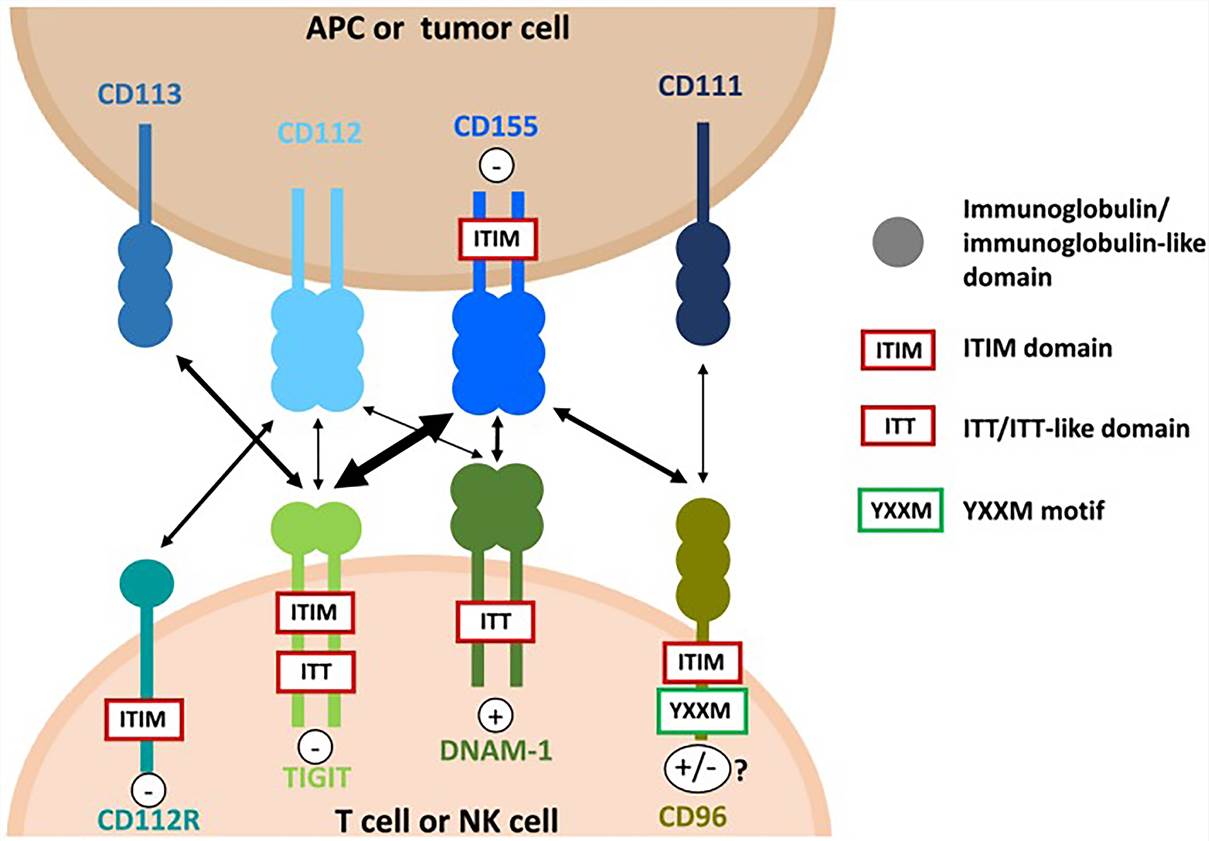TIGIT Assay Portfolio Service
Immunotherapy that uses the activity of the immune system against tumors is be proved an effective approach in several malignancies. T cell immunoglobulin and ITIM domain (TIGIT) is an emerging immune checkpoint that plays a critical role in limiting adaptive and innate immunity. With advanced and high-end technologies, rich experienced scientists, Creative Biolabs is an excellent service provider in the field of tumor marker assay. After long years ahead to fully comprehend tumor markers, we launch our TIGIT assay portfolio service which can be useful in targeted cancer therapy and diagnosis.
Introduction of TIGIT
TIGIT, also known as WUCAM, Vstm3, VSIG9, is a receptor belonging to the Ig superfamily, which is expressed by activated CD8+ T and CD4+ T cells, natural killer cells, regulatory T cells, and follicular T helper cells in humans. The TIGIT has three ligands, CD155, CD112 and CD113, which all belong to a family of nectin and NECL molecules, which regroups cell surface molecules that mediate cell adhesion, cell polarization and tissue organization. TIGIT joins in a complex regulatory network involving one competing for costimulatory receptor including DNAM-1/CD226, multiple IRs including CD96/TACTILE and CD112R/PVRIG and multiple ligands including CD155 and CD112.
 Fig.1 The TIGIT/CD226/CD96/CD112R axis. (Harjunpää, 2020)
Fig.1 The TIGIT/CD226/CD96/CD112R axis. (Harjunpää, 2020)
Mechanisms of Inhibition
The TIGIT inhibits innate and adaptive immunity through multiple mechanisms.
-
TIGIT directly inhibits signals in T cells by binding to CD155 and triggers.
-
TIGIT indirectly inhibits T cells by binding to CD155 on APCs to trigger IL-10 production and decrease IL-12 production.
-
TIGIT impedes CD226-mediated T cell activation by binding to CD155 with higher affinity than CD226 or disrupting CD226 homodimerization.
-
TIGIT signaling enhances their immunosuppressive functions in Tregs.
-
Fap2 protein from the gut bacteria Fusobacterium nucleatum inhibits signals by binding to TIGIT to trigger inhibitory signals.
The Role of TIGIT in Immune Biology
-
TIGIT is a crucial immunoreceptor for limiting T cell inflammation.
-
TIGIT has properties that make it attractive as a target for immunotherapy.
TIGIT in Cancer Immunotherapy
-
Dual TIGIT and PD-1/PD-L1 blockade synergize to enhance proliferation and function of antitumor CD8+ T cells, leading to complete tumor rejection, protective memory T cells, and prolonged overall survival.
-
TIGIT blockade acts primarily by tipping CD155-mediated signaling towards CD226 activation.
-
Blockade and deletion of TIGIT promote NK cell-mediated antitumor reactivity in vitro and in vivo.
-
Except for PD-1 blockade, other ICBs combined with TIGIT blockade also enhance antitumor immune responses, such as TIM-3, CD112R, CD96.
TIGIT Blockade Assays at Creative Biolabs Including but Not Limited to:
-
Proliferation assay
-
Invasion assay
-
Metastases assay
-
Cytokine assay
-
Apoptosis assay
-
Cytotoxicity assay
-
Immune responses assay
If you are interested in our service, please contact us or directly send us.
References
-
Harjunpää, H.; et al. TIGIT as an emerging immune checkpoint. Clin Exp Immunol. 2020, 200(2): 108-119.
-
Chauvin, J.M.; et al. TIGIT in cancer immunotherapy. J Immunother Cancer. 2020, 8(2): e000957.
For Research Use Only | Not For Clinical Use


 Fig.1 The TIGIT/CD226/CD96/CD112R axis. (Harjunpää, 2020)
Fig.1 The TIGIT/CD226/CD96/CD112R axis. (Harjunpää, 2020)
 Download our brochure
Download our brochure